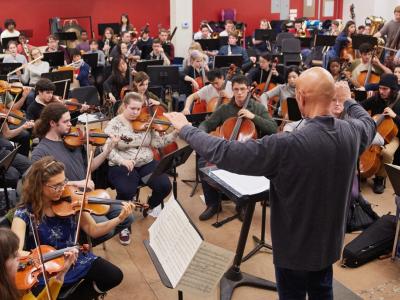Learn what it takes to launch and run a successful live music venue. This undergraduate music business course prepares you to manage successful shows by understanding venue logistics, artist relations, and the collaborative roles that drive thriving live music spaces.
Key Learning Outcomes
- Develop a viable business plan for launching and operating a live music venue, including concept, market positioning, and financial considerations
- Plan and manage day-to-day venue operations, covering staffing, safety, hospitality, and regulatory requirements
- Book, promote, and ticket live music events using strategies that align artist needs, audience development, and revenue goals
- Evaluate the financial risks and rewards of operating a live music venue and make informed decisions that balance sustainability with growth
Course Description
In the ever-changing world of music, the business of live performance holds steady as the industry’s lifeblood. In this course, you will learn what it takes to launch and run a successful live music venue.
The course explores the inner-workings of establishing and running nightly shows at a music club, in addition to the key stakeholders who make or break a live-club event, including the talent buyer, publicist, promoter, artist manager, employees, booking agents, and the ticket-buying fans. Insights will be provided from professionals who work every day in the live-music field, managing clubs and bringing music to the fans.
By the end of this course, you will be able to:
- Design venue spaces that support effective staging, sound reinforcement, lighting, and audience experience
- Build productive relationships with artists, agents, promoters, sponsors, and community stakeholders
- Apply marketing and promotional strategies to increase attendance and visibility in a competitive live music landscape
- Analyze venue performance using data, accounting practices, and post-show evaluation to inform future programming decisions
- Navigate performance rights, ticketing systems, and industry partnerships essential to running a compliant and professional venue
Syllabus
Lesson 1: So You Want to Open a Music Venue?
- History of Live Music Venues
- What's in a Room?
- Operational and Non Music-Related Considerations
- Community Relations/Being a Trusted Neighbor
- Location, Location, Location
Lesson 2: Venue Varieties and Your Team
- Music Club Venue Types
- Small Capacity Venue
- Larger Capacity Venue
- Assembling a Team
- Scalability: Small Venue to Large-Sized Club Venue
Lesson 3: New Trends in Live Music
- Music Genres
- Marketing: Online and Traditional
- Residencies and Theme Nights
- The DJ Experience/EDM
- Competition from Other Mediums
Lesson 4: Venue Operations
- A Day in the Life of a Music Club
- Fiduciary Responsibilities
- Performance Rights Organizations and Rights Ownership
- Data Utilization
Lesson 5: Music Venue Design
- Bricks and Mortar: The Music Club
- Club Profiles
- Establishing Your Establishment: Expert Advice
- Buying an Existing Room
Lesson 6: Booking the Venue
- Booking Agents, Talent Buyers, Agents
- Finding Patrons and Your Audience
- Paying the Band: Guarantees vs. Percentages
- Bookkeeping and Accounting
Lesson 7: Sound Reinforcement, Visual Equipment
- Acoustics
- Modern Sound Equipment
- Choosing the Appropriate System for Various Club Types
- Live Sound Engineering and Lighting Basics
- Turn that $#@% Down!: Sound Level
- Value Added: Multimedia and Recording, and the Show for the Band and Their Fans
Lesson 8: Promotions
- Show Is Booked, What’s Next?
- Oversaturation, Double Booking, Weak Sales, and the Impact on a Venue
- Promoters Extraordinaire
- Outside Promoters
Lesson 9: Ticketing
- History of Ticketing Services in the Live Music Industry
- In-House Ticketing and Ticketing Services
- Pearl Jam vs. Ticketmaster
- Show Pricing
Lesson 10: Playing the Venue/From the Musician’s Perspective
- Playing the Gig: Which Venue?
- Professional Attitude: Etiquette and Communication
- Partnering with the Venue to Promote a Show
- Playing the Room: Working Productively with the Sound and Lighting Engineer
- We Rocked! But Was the Show a Success?
Lesson 11: Partnerships: Working Successfully with Stakeholders
- The Importance of Professional Relationships
- Publicizing Shows
- Arranging Sponsorships
- Community Building
Lesson 12: Understanding Today’s Music Business from a Club’s Perspective
- The Emerging Roles of Managers, Agents, and Social Media Specialists
- New Technological Opportunities for Live Music
- Promoting Shows at Non-Musical Venues to Popularize your Brand
- The Larger Venue: Cafe 939 vs. House of Blues
- Your Business Plan
Requirements
Prerequisites and Course-Specific Requirements
Prerequisite Courses, Knowledge, and/or Skills
This course does not have any prerequisites.
Textbook(s)
- Raise the Bar: An Action-Based Method for Maximum Customer Reactions by Jon Taffer and Karen Kelly (New Harvest, 2013)
Media and Subscriptions
- A subscription to a music streaming service, such as Apple Music, TIDAL, Spotify, etc.
Student Deals
After enrolling, be sure to check out our Student Deals page for various offers on software, hardware, and more. Please contact support@online.berklee.edu with any questions.
General Course Requirements
Below are the minimum requirements to access the course environment and participate in Live Classes. Please make sure to also check the Prerequisites and Course-Specific Requirements section above, and ensure your computer meets or exceeds the minimum system requirements for all software needed for your course.
Mac Users
- macOS Monterey 12.0 or later
PC Users
All Users
- Latest version of Google Chrome
- Zoom meeting software
- Webcam
- Speakers or headphones
- External or internal microphone
- Broadband Internet connection
Instructors
Author
Michael Creamer is a talent buyer and venue manager at Berklee College of Music. Michael began his career over 20 years ago as an artist manager, and his roster includes Letters to Cleo, Superdrag, Kim Taylor, Oteil Bubridge, Kay Hanley, and Grownup Noise, to name a few. He was the co-owner of a very popular music venue in Cambridge, MA, for 10 years and has promoted shows all over the United States. He has worked with both indie and major label artists. He was nominated for a Grammy in 2009 for Best Historical Box Set for The Woody Guthrie “My Dusty Road,” which he produced. Michael also produces many successful charity events including Theo and Paul Epstein’s “Hot Stove, Cool Music” in Boston and Chicago.
Author
John Scotti is a senior course developer at Berklee Online. Since his teens, he has been performing at music venues close to his hometown of Boston and as far away as Iwo Jima. He is also an audio engineer and producer with studio and live venue experience.
Instructor
Matt Smith is the Managing Director of Passim, a non-profit arts organization in Cambridge, MA. Club Passim, which started at Club 47 in 1958, hosts over 400 shows per year in their 110-seat venue. Matt has been on panels, juries and committees at the Falcon Ridge Folk Festival, Folk Alliance International, and the Northeast Regional Folk Alliance. He has worked as a tour manager, sound engineer, and stage manager/MC for various tours and festivals. Matt has also served two terms on the Board of Directors of Folk Alliance International and is a former President of that board.
What's Next?
When taken for credit, Music Venue Management can be applied towards the completion of these related programs:
Related Certificate Programs
Related Degree Majors
Questions?
Contact our Academic Advisors by phone at 1-866-BERKLEE (U.S.), 1-617-747-2146 (INT'L), or by email at advisors@online.berklee.edu.












